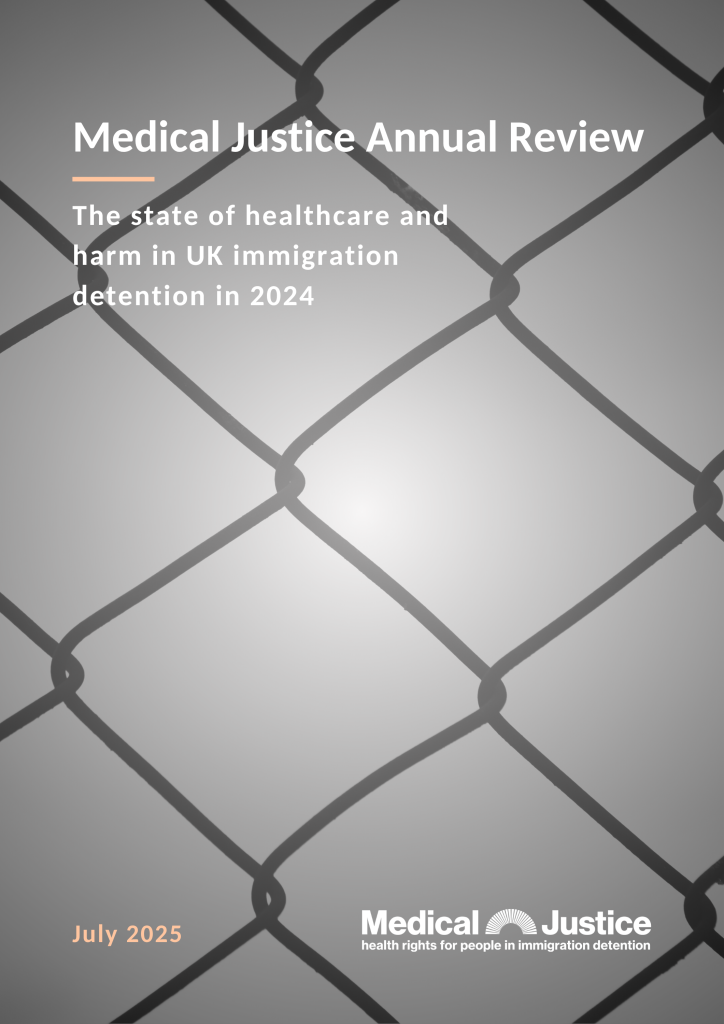Medical Justice’s annual review, published for the first time, highlights how failures in clinical safeguards continued to put vulnerable people at unacceptable levels of risk and failed to prevent harm in immigration detention during 2024.
Medical Justice Annual Review: The state of healthcare and harm in UK immigration detention in 2024 draws on a detailed statistical analysis of clinical and other evidence from 73 clients detained at immigration removal centres (IRCs) who were assessed by independent clinicians working with the charity and who received completed medico-legal reports in 2024. It documents the prevalence of factors that are likely to make Medical Justice clients particularly vulnerable to suffering harm in detention. These factors include having a history of torture, trafficking and other trauma, as well as mental and physical health conditions. The review also considers health deterioration while detained, levels of suicidality, and available healthcare provision in detention.
A deep dive into the functioning of available safeguarding mechanisms reveals worrying failures in implementation – including of the initial healthcare screening undertaken by IRC healthcare staff, medical examinations mandated by Rule 34 of the Detention Centre Rules, reporting of vulnerabilities under Rule 35, and Assessment Care in Detention and Teamwork (ACDT) – a process intended to manage the risk of self-harm and suicide. The review also highlights the inappropriate use of segregation and of force on vulnerable detained people.
The findings are stark:
- 82% of the clients included in this review were survivors of torture and 63% reported a history of trafficking. However, healthcare screenings on arrival largely failed to identify these critical vulnerabilities – missing 77% of the survivors of torture and 89% with a reported history of trafficking.
- 99% had a diagnosis of at least one mental health condition, including post-traumatic stress disorder, according to the Medical Justice clinician. Many of these were new diagnoses that had been missed or not explored by healthcare in detention.
- The mental state of 97% of clients deteriorated while in detention and 74% had an increased risk of suicide since they were detained. 23% of clients self-harmed in detention and three people attempted suicide.
- Only 6% of clients that Medical Justice clinicians assessed had been harmed by detention had a Rule 35 (1) safeguarding report as they should have had. This is the report IRC GPs are required to complete to alert the Home Office that they suspect a detained person is likely to be injuriously affected by detention and which triggers a detention review.
- Clients with mental health conditions were put in segregation for extended periods. More than half of these clients (53%) were not visited daily by the IRC GP, as required by the Detention Centre Rules.
- Force was used on 16 clients, with force applied to two clients’ head and neck.
- 90% of clients were eventually released, calling into question the justification for their detention in the first place.
“These findings highlight not only the scale of unnecessary harm that indefinite immigration detention causes vulnerable people on a daily basis, but also the ongoing systemic failure of safeguarding mechanisms that are supposed to protect them,” said Ariel Plotkin, Researcher at Medical Justice.
“We know only too well that ineffective safeguards can lead to life-or-death situations. Yet rather than addressing the failings that we have repeatedly warned them about, the government plans to increase detention capacity and speed up removals, including with the arbitrary and dehumanising new ‘one in, one out’ deal with France. Under these arrangements, more people will be detained and even more pressure will be added to an already broken, dangerous and harmful system.”
Medical Justice recommends that immigration detention must end and the government should also consider credible community-based alternatives.
In the interim, the risk of further mistreatment and abuse can be reduced by promptly implementing all 33 recommendations of the Brook House Inquiry and ensuring that the review of the Adults at Risk in Immigration Detention policy currently underway strengthens the available protections rather than further weakening them.
For more information and to arrange media interviews, please contact:
Emma Ginn, Director, emma.ginn@medicaljustice.org.uk
